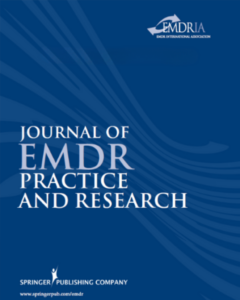Sleep-Dependent Memory Processing and EMDR Action (Journal of EMDR Practice and Research)
The possibility that bilateral stimulation induces a brain/mind state similar to that of rapid eye movement sleep is supported by studies.
Read MoreEMDR and the Adaptive Information Processing Model: Potential Mechanisms of Change (Journal of EMDR Practice and Research)
Throughout the article a variety of mechanisms of action are discussed, including those inferred by tenets of the AIP model, and the EMDR procedures themselves, including the bilateral stimulation.
Read MoreReduced misinformation effects following saccadic bilateral eye movements (Brain and Cognition)
The effects of saccadic bilateral (horizontal) eye movements on memory for a visual event narrative were investigated.
Read MoreEffects of eye movement versus therapist instructions on the processing of distressing memories (Journal of Anxiety Disorders)
The effectiveness of EMDR was tested by randomly assigning 48 participants to either an eye movement or an eye stationary condition.
Read MorePhysiological correlates of eye movement desensitization and reprocessing (Journal of Anxiety Disorders)
This study explored physiological correlates of eye movements during EMDR in relation to current hypotheses; distraction, conditioning, etc.
Read MoreHow eye movements affect unpleasant memories: Support for a working-memory account (Behaviour Research and Therapy)
Participants in this study rated unpleasant autobiographical memories before and after eye movements or an eyes stationary control condition.
Read MoreEffects of bilateral eye movement on retrieval of item, associative and contextual information (Neuropsychology)
Two experiments investigated the effects of saccadic bilateral eye movements on the retrieval of item, associative, and contextual information. Bilateral eye movements increased correct recall for both types of context.
Read MoreNeuroanatomical changes after eye movement desensitization and reprocessing (EMDR) treatment in posttraumatic stress disorder (Journal of Neuropsychiatry and Clinical Neuroscience)
Some studies have suggested that psychotropic drugs may promote hippocampus neurogenesis and reverse the decrease in hippocampus volume.
Read MoreEffects of EMDR psychotherapy on 99mTc-HMPAO distribution in occupation-related post-traumatic stress disorder (Nuclear Medicine Communications)
Study dealing with work-related PTSD, and investigations on the effect of treatment on cerebral blood flow following EMDR therapy.
Read MoreEffect of bilateral eye movements on frontal interhemispheric gamma EEG coherence: implications for EMDR therapy (The Journal of Nervous and Mental Disease)
The present study examined the effects of the eye movements used in EMDR on interhemispheric electroencephalogram coherence.
Read MoreAssessment of Psychophysiological Stress Reactions During a Traumatic Reminder in Patients Treated With EMDR (Journal of EMDR Practice and Research)
This study investigates changes of stress-related psychophysiological reactions after treatment with EMDR. Sixteen patients with PTSD following type I trauma underwent psychometric and psychophysiological assessment during exposure to script-driven imagery before and after EMDR and at 6-month follow-up.
Read MoreChanges in the Regional Cerebral Perfusion After Eye Movement Desensitization and Reprocessing: A SPECT Study of Two Cases (Journal of EMDR Practice and Research)
EMDR has emerged as a promising new treatment for trauma and other anxiety-based disorders. However, the neurobiological mechanism of EMDR has not been well understood.
Read More


